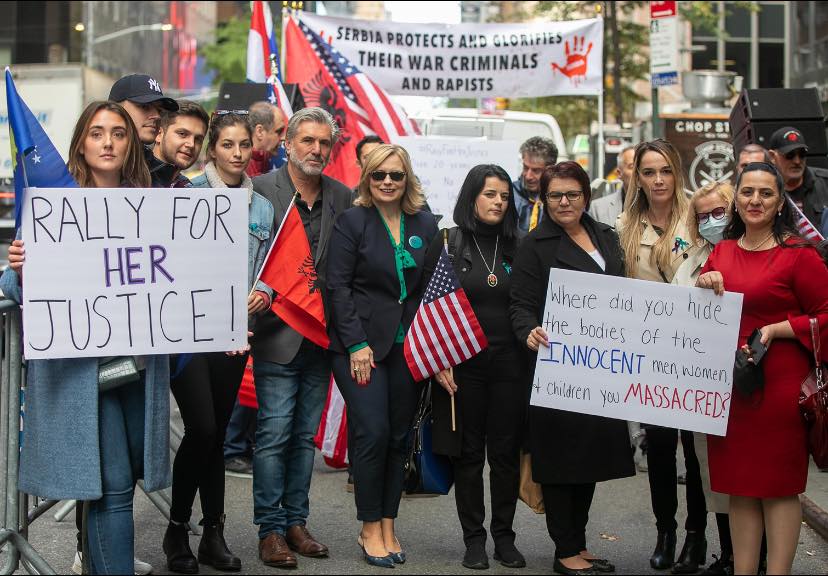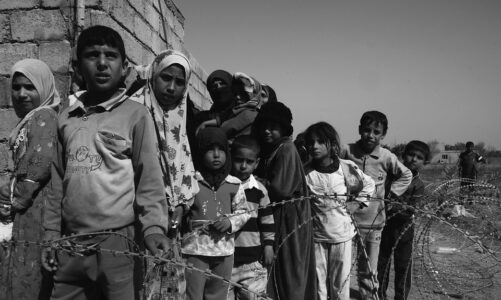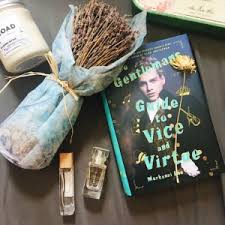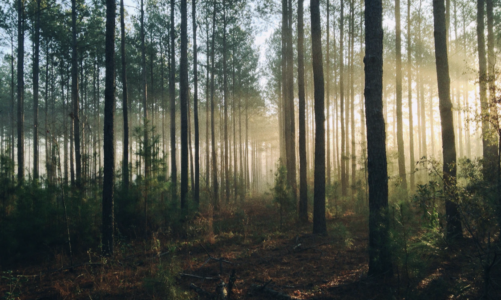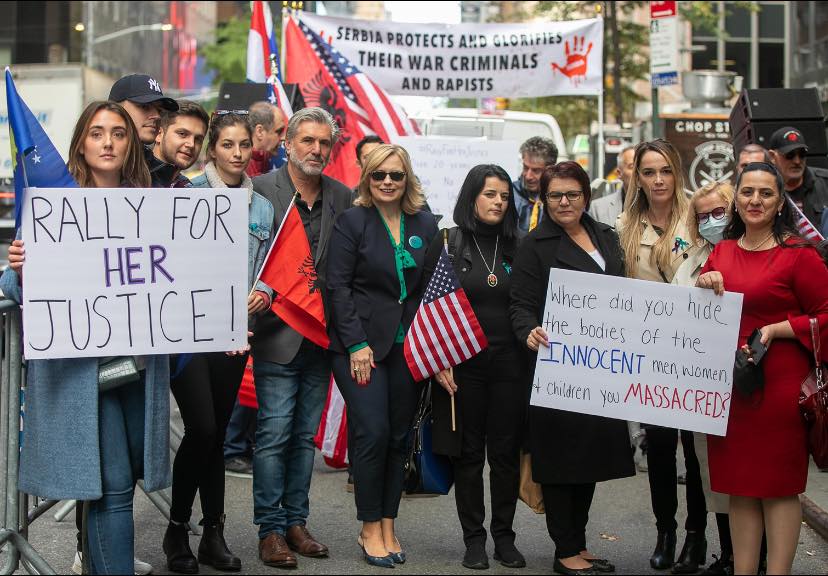
Jane Rovich was in her high school math class when the news broke. It had been just another dreary Thursday, but this moment is engraved in her mind forever. The classroom was buzzing with hushed murmurs of the words “war criminal” and “suicide”. Her heart sank to her stomach.
Upon leaving class, Rovich learned that immediately after being given a 20-year sentence for war crimes, General Slobodan Praljak swallowed a vial of poison, committing suicide and evading punishment. His last words echo in her brain forever.
“It makes my blood boil,” she says achingly. “He stands up, and he says his full name. ‘I am not a war criminal, and I condemn this.’ He evades all responsibility for everything.”
As the daughter of Bosnian-Muslim refugees, Rovich understands the emotional pain that comes with the injustice of genocide denial. Her parents were living in Bosnia in 1992 when violence erupted across the Balkans following the breakup of Yugoslavia. Serbian leaders utilized ethnonationalism to promote the invasion of Bosnia to “free” the Orthodox Christian Serbians living in Bosnia. Serb forces seized the capital city of Sarajevo and began a campaign of violence and ethnic cleansing against non-Serbs, particularly Bosnian Muslims, also known as Bosniaks.
The atrocities of the Bosnian genocide will never be forgotten. With the 30th anniversary of the war approaching, it has become harder for them to reconcile with the injustices of the past, especially with the re-emergence of Serbian nationalism. It is even more difficult to heal given the climate of ethnic hatred dominating news cycles beyond Bosnia with white nationalism in America, Chinese persecutions of Uyghurs, and Holocaust denial running rampant.
With the recent rise of ethnonationalism and the inability to fully achieve justice, Bosnian survivors, especially those in New York City, are wanting to connect to their culture and honor those lost in the Genocide. Due to the large diaspora after the war, Bosnians lack a concentrated community in NYC, but activists and artists are attempting to catalyze a community with efforts reflecting the importance of genocide remembrance.
Activism campaigns are helping Bosnians come together to protest the unpunished war crimes. The diaspora makes it difficult to find a concentrated community in cities like New York, but activists are promoting rallies and protests to connect Bosnian survivors fighting for justice.
“The survivors who fled Bosnia fled to more than 80 countries around the world,” says Tanya Domi, a professor at Columbia University with expertise on Bosnia as well as conflict-related sexual violence. She is involved with the New York-based Rally for Her Justice organization focused on bringing survivors together to protest unpunished sexual war crimes in Bosnia, Kosovo, and Croatia.
Domi worked as a congressional aide in 1991 to Congressman Frank McCloskey who she says, “became the conscience of the house on the Bosnian war, speaking against Republican and Democratic administrations on their failure to act.” After the war ended, she went to Sarajevo with the state department to get the country back on its feet while witnessing the destruction of genocide.
“Genocide works,” says Domi recalling her experiences in Sarajevo. “In Bosnia, it’s estimated up to 50,000 women were raped…the level of brutality is off the scale.”
Despite the claims of genocide deniers, by the end of the war in 1995, around 100,000 civilians were killed, 2 million were displaced, and around 50,000 women were raped as a weapon of war. While the International Criminal Tribunal for the Former Yugoslavia held many war criminals responsible for their crimes against humanity, much of the violence was committed by civilians, so it is difficult to punish every perpetrator.
The Rally for Her Justice movement works with Domi to organize protests against these unpunished sexual crimes committed in Kosovo and Bosnia. The team is bringing the use of rape as a weapon of war to public attention, and they do this through annual rallies in front of the Serbian consulate in New York.
“This has to change. There has to be justice,” says Domi. “There have to be mechanisms of justice for the survivors, and we must do something to prevent the continuation of this because what we’re seeing now is a true escalation in brutality and it will continue to escalate until there is an intervention.”
The effects of the injustice noted by Domi are perpetuated by local UN officials who have noted heightened emotions from local Bosnians regarding the anniversary of the war and continued denial from Serbia.
“People are still traumatized by the war because most of the people who participated in the war actively, either as the population or military or politically or socially are still alive. But people do appreciate it, and it is a big date,” says a senior staff member at the UN in Bosnia.
Beyond activism campaigns, Aida Šehović, a Sarajevo and New York-based artist, is uniting the community through her nomadic monument of coffee cups titled, Što Te Nema. The cups are displayed in public plazas and parks to honor the victims of the Bosnian Genocide.
“As a first-generation Bosnian Muslim Immigrant, the core of Aida Šehović’s work has been to address her cultural heritage through a combination of ritual and politics. Her artworks are based on facts, history, participation, and memory,” her artist statement reads.
Sehovic began the monument in 2006 in Sarajevo, displaying 932 coffee cups she collected from local families. Today, the growing monument has been displayed in cities like New York City, Toronto, and Geneva. Her team has collected 8,372 cups with the support of Bosnians living abroad, with each cup representing a life lost during the Srebrenica Massacre.
The influence of Sehovic’s nomadic monument represents an increasing connection between the Bosnian diaspora communities with the goal of “creating sites of remembrance together.”
Both the Što Te Nema monument and Rally for Her Justice movement are supporting first-generation American Bosnians like Jane Rovich in reconnecting with their culture and finding community.
“It’s the nature of being refugees and running from a country and continued persecution. We haven’t been able to find a set community in a metropolitan city,” says Rovich. “There are still resources, projects, and people trying to create the communities.”
Still, for Rovich, the most important part of remembering the Bosnian Genocide is understanding the dangers of what caused it.
“I would say starting on the forefront of being aware of local nationalism, and how terrifying that it can manifest in our country and all around the world” urges Rovich, “and if anything, it should be these examples that are remembered in this anniversary. The anniversary should serve as a reminder of what happens when nationalism goes unchecked.”
Despite the intensive efforts put forth by both the Rally for Her Justice Campaign and the Što Te Nema Monument, genocide denial and nationalistic rhetoric still penetrate everyday life.
“The rise in nationalism…it is visible across the western Balkans… You see the new national movements are on the rise. But I think that’s naturally attractive throughout the west and, naturally, here, which is one of the most undeveloped parts of what can be considered the west,” says the senior staff member at the UN in Bosnia.
Ethnonationalism is not only on the rise in Bosnia, but hateful speech has become embedded in society as we know it. From the rise of white nationalism in the United States to the far-right German Reichsbürger group just arrested for an attempted coup, the emergence of ethnic hatred makes recalling the Bosnian Genocide even more important.
“It’s terrifying because as a Western society, we continue to say never again, never again,” exclaims Rovich, “but we have ethnic cleansing in Ukraine and China. This continues to happen despite the fact we say never again, so it’s up to us to share the stories and share the narrative.”
(Jane Rovich is an alias for a student wishing to remain anonymous)

